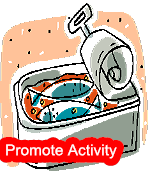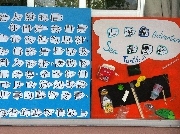From the International Law of the Sea to the Taiwan Marine Conservation Law, and from the Wildlife Protection Act to the Sustainable Fisheries Act, they are all telling us to protect marine ecology. Marine conservation is not something that can be achieved by just a few people. In fact it has to be done with the cooperation of everyone. Marine conservation is not just a saying; it’s something that must be put into action.
-
By actually calculating the amount of anchovy larvae we consume in a single meal, we realized that by eating one bowl of anchovy larvae we are actually killing 1931 fish larvae, and anchovy larvae a so called calcium supplementing food is in fact the general term for all larvae. I we eat it now we would have to consume over one thousand of this fish, and if we wait for it to grow into a big fish, we only have to eat one. As long as we stop eating anchovy larvae, we are indirectly conserving marine ecology.
-
After interviewing Mr. Guang-chao Tsou, we learned that in the “Seafood Guide”, we were told what fish to consume and not to consume. Those which were in the “do not consume” list were commonly consumed fishes such as salmon and tuna. This means that a lot of these commercial fishes were facing the fate of deletion. If we continue to hunt for these fishes, there will be an imbalance in marine ecology.
To use, the ocean is mean in which we attain resources. However, the resources of the ocean are not inexhaustible. With the allowance of rampant catching of and indiscriminate killing, our marine resources are almost running out. Therefore, only through marine conservation can we coexist with the ocean. In order to continue to have fishes in the future, we should understand the kinds of fish that we eat that would affect the ecosystem of the ocean. We should also put the notion into action. When buying seafood comply with the list in the Seafood Guide. This way we will have a never ending supply of marine resources!
1. Refuse to eat Bluefin tuna, and tell your friends to do so as well. Boycott any activities of the Bluefin tuna festival.
2. Demand that the government implement the banning of the fishing of protected fish. Also tell politicians to respect science, decrease the number of fishing boats, restrict fishing quantity, and ban illegal fishing gear and methods.
3. Enrich marine knowledge, read “Biodiversity column”.
4. When buying seafood follow the suggestion in the “Taiwan Seafood Guide”.

* Marine Ecology Conservation Awareness Promotion: SOS~ A letter from the Victim of a Destroying Marine Ecosystem.
We tried to put ourselves in the shoes of the creatures of the ocean, imaging the things which they had to go through and reasons. So, we made a picture book called” SOS A letter from the Victim of a Destroying Marine Ecosystem.” Also, through promotion of awareness in classrooms let more of our schoolmates take part in our cause. We were able to have a better understanding of the situations of marine life. Finally, we made our picture book into an eBook, and post it on YouTube. We hope by doing so we can be an influence on more people.
*Feelings
In the news we constantly see reports of marine life stranded, and when we go to the beach we see usually see garbage. When we see all this, we have to think about what we can do to help to protect our ocean.
*Imagine
We read our story to low and medium grade school students and encourage them to take part in various Marine Conservation events, such as, clearing the Beach.
We wanted to make our story into an audio book, and send it to all the teachers of our school as material for teaching Marine Education.
Lastly, we put it on YouTube. We hope a lot of people would click on it and care for the topic of marine conservation.
*Implementing and Sharing
In the end we made a picture story book to let people know about the importance of marine conservation, and made it into an eBook for the viewing of all, hence accomplished our mission. We hope that everybody can take part in the cause of marine conservation with us.
2013estmuegifted18 / 024x768







